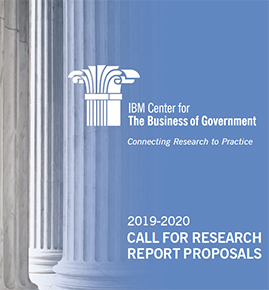
New Research Report Recipients

We are pleased to announce our latest round of awards for new reports on key public sector challenges, which respond to priorities identified in the Center's research agenda. These reports will continue to catalyze and accelerate the production of practical research with actionable recommendations that benefits public sector leaders and managers.
We expect the following reports to be published starting in early 2020. Short summaries of each report follow:
Designing Learning Agendas: Moving Beyond Compliance by Kathryn Newcomer, Trachtenberg School of Public Policy and Public Administration, George Washington University; Nicholas Hart, Data Coalition; and Karol Olejniczak, Institute of Social Sciences, University of Social Sciences and Humanities, Warsaw, Poland
This report will examine how Learning Agendas, one of the “Foundations for Evidence-Based Policymaking Act of 2018” requirements, can be implemented to strengthen insights and promote meaningful performance improvements within federal agencies, and help agencies develop capacities to address 21st century technology and workforce challenges.
The research will apply a three-stage design methodology: (1) explore perspectives of agencies that already initiated Learning Agendas; (2) create a blueprint for Learning Agenda development, and (3) test this prototype in two federal agencies. The report will provide agencies with a blueprint for developing Learning Agendas. It will also support efforts by the Office of Management and Budget and Congress to encourage agencies to be intentional and deliberative in planning evidence-building capacity.
Human-Centered Design in Digital Service Transformation by Ines Mergel, University of Konstanz, Germany
Digital service teams are bringing service designers into government to transform service delivery. These designers use human-centered design approaches to help public sector organizations refine strategies, rethink the nature of services, and most importantly reflect the way that citizens want to use a public service. The findings of this report will focus specifically on digital service delivery, with results that address principles, mindsets, techniques, and practices. The report will help public managers and civil servants who collaborate with external IT partners to build competences for cross-functional teams who redesign public services.
Improving Efficiency and Equitability through Machine Learning and Advances in Data-Driven Management by Joseph Avery, Princeton University
Private sector companies expect their managers to use data science to improve and even optimize decision making. Yet some large public institutions have an aversion to applying cognitive computing techniques to high-stakes decisions, placing greater weight on human experience and intuition -- which can lead to biased outcomes. Instead of viewing potentially biased historical data and data-hungry researchers as liabilities, government agencies should view them as assets in the struggle for outcome fairness and organizational efficiency. In our report, we will explore a case study of how this approach can help improve prosecutorial effectivess and fairness, and draw lessons from this case to develop a process for equipping offices to use advanced analytics to guide accurate decision making.
New Platforms for Unlocking the Civic Potential Of Emerging Technologies by Alexander Shermansong, New York University
Emerging technologies, such as self-driving cars and the Internet of Things, are reshaping how we live and work. But red tape can inhibit innovation. The Federal government has several innovation programs; but cities offer many more models. This report will profile effective city innovation programs in order to identify key elements needed for replicating their success at all levels of government: What leadership and mindsets do agencies need to engage industry? What staffing, skills, and training do they need? How should policies and regulations change to accelerate emerging technologies’ impact?



